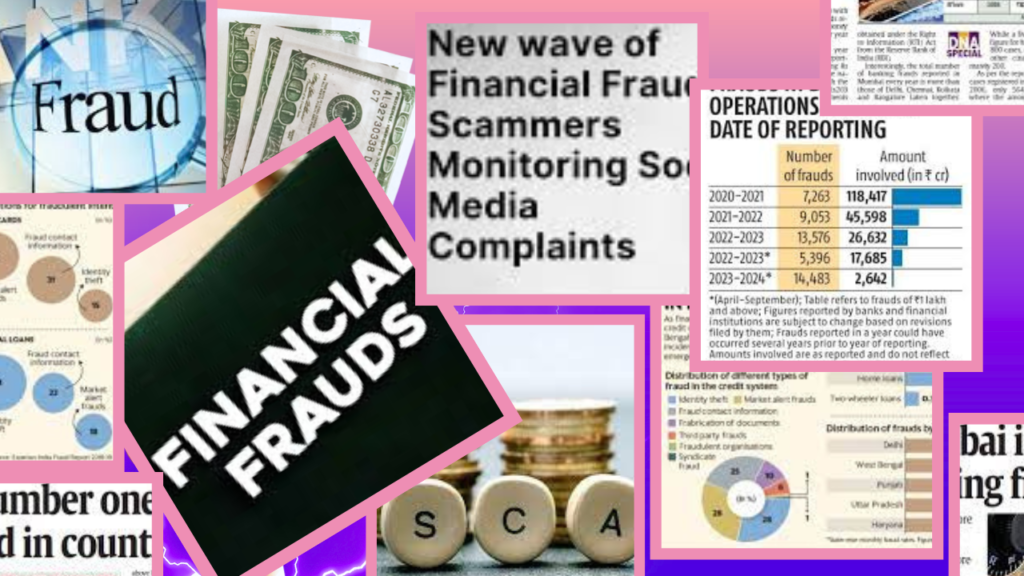Beyond the Buzzwords: How to Stay Safe in the Financial Jungle?
However, investing Rs 1 lakh and getting Rs 1000 daily, investing in new cryptocurrency to earn hundredfold profits, and seeing offers of gold bars at half price every day all sound too good to be true. These are likely scams or schemes with hidden risks and costs. Not just limited to online scams, we face microfinance schemes, share market manipulation, AI-driven exploits, and even simple investment scams. As our reliance on online services grows, so do the avenues for these predatory acts. India, unfortunately, has become a hotspot for these scams, with loan app frauds and OTP phishing reaching alarming levels. These schemes target the most vulnerable like the unemployed, women, those facing financial strain, etc.

The post-pandemic boom in digital banking has been a double-edged sword. While convenient banking apps like UPI have simplified our lives, they’ve also opened doors for fraudsters seeking easy prey. It’s crucial to remain vigilant and understand the tactics these criminals employ.
Fraudsters are always lurking, using cunning tactics like phishing, vishing, and skimming to steal your money and personal information. Emails, SMS, and phone calls claiming to be from banks, financial institutions, or even utility companies lure you into disclosing personal details like OTPs, account numbers, PINs, and CVVs. They often use tactics like urgency, threats, and familiarity to exploit your trust. Remember, legitimate institutions rarely contact you for such sensitive information through unsolicited communication.
Shopping sites and other businesses might call or message you with tempting offers of refunds or special deals, often requiring your UPI PIN for “verification.” This is a trick to steal your money. Never share your UPI PIN or any other sensitive financial information over unsolicited calls or messages. Taking photos of your cards or saving their details on unreliable devices or websites, even for convenience, is risky. Mobile data leaks are increasingly common, exposing your information to potential theft.
Downloading apps from untrusted sources outside official app stores like Google Play Store makes your phone vulnerable to malware and phishing attacks. These apps can steal your personal information and financial data.
Loan App Scams
Beware of loan apps promising easy money without collateral. Installing such apps grants them access to your personal information, contacts, and even location, putting you at risk of harassment and exploitation. Don’t rely solely on loan apps for financial needs.
Investment Frauds
Ponzi schemes promise unrealistic returns and lure investors with early payouts funded by new money. Ultimately, they collapse, leaving everyone with losses. Beware of investments offering guaranteed high returns with little or no risk.
Pump-and-dump scams, manipulating stock prices through fabricated hype, and dumping shares before others catch on are another fraudulent tactics. Do your research and invest only in legitimate, transparent financial instruments.
Essential Tips to Avoid Financial Scams
- Always verify: Contact the official source directly through trusted channels whenever you receive suspicious messages or calls.
- Never share sensitive information: OTPs, PINs, account numbers, and CVVs are confidential. Legitimate institutions rarely ask for them unsolicited.
- Beware of urgency and threats: Scammers often create a sense of urgency or use threats to pressure you into quick decisions. Stay calm, and don’t act hastily.
- Use trusted platforms: Conduct financial transactions through official bank channels or secure websites.
- Research and report: Before any investment, research the scheme thoroughly. Report suspicious activity to authorities.
- Guard your personal and financial data: Never share details like passwords, account numbers, or PINs via phone, email, or SMS, even with supposed representatives from your bank or other legitimate institutions. Legitimate entities will never request such information through these channels.
- Approach high-return, low-risk investments with skepticism: If an investment sounds too good to be true, it probably is. Research thoroughly before committing any funds, and avoid chasing guaranteed returns.
- Choose authorized platforms and intermediaries: Verify that your investment platforms and brokers are registered with regulatory bodies like SEBI. Stick to reputable and established institutions.
- Be cautious with online activities: Exercise caution when clicking links or downloading attachments from unknown sources, especially in emails or social media messages. Phishing scams are common, so be vigilant.
- Don’t mix finances with emotions: Personal relationships shouldn’t cloud your financial judgment. Avoid investing in products you don’t fully understand just because someone you know recommends them.
- Report suspected fraud promptly: If you encounter any suspicious activity or suspect a scam, immediately report it to your bank, the relevant authorities, and anti-fraud organizations.
- Set up strong passwords and enable two-factor authentication.
- Regularly monitor your bank statements and credit reports for unauthorized activity.
- Educate yourself about common scam tactics.
- Don’t be afraid to say no to aggressive or pushy pitches.
There are many ways to become a victim of fraud, but there is only one way for victims to report to the police. If in Kerala, call the toll-free number 1930. The service is available 24 hours a day. Also, complaints can be filed online from the comfort of home on the Indian Government’s National Cyber Crime Report. Remember, there is no guaranteed way to get rich quickly. Any investment that promises high returns without risk is likely a scam. It’s important to do your research and invest wisely to avoid losing your money. Just being careful can greatly reduce your risk of becoming a victim of financial scams.
